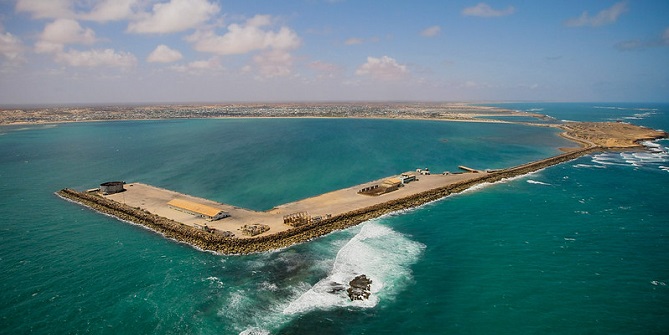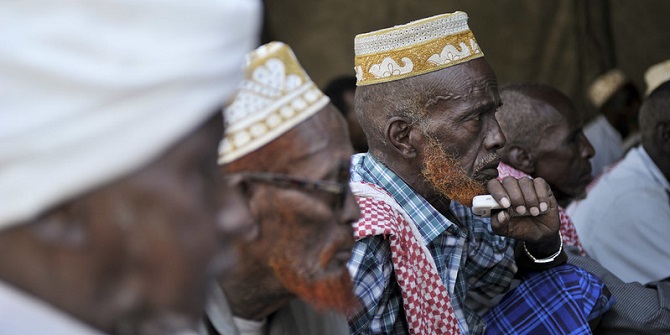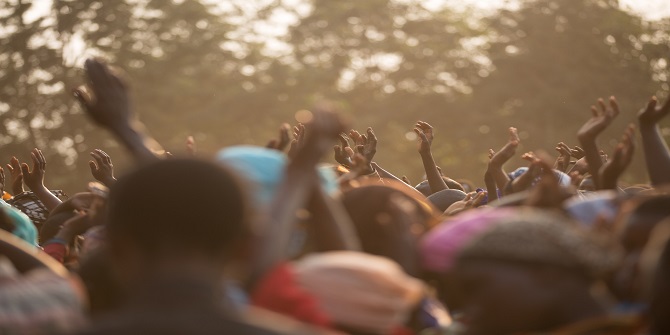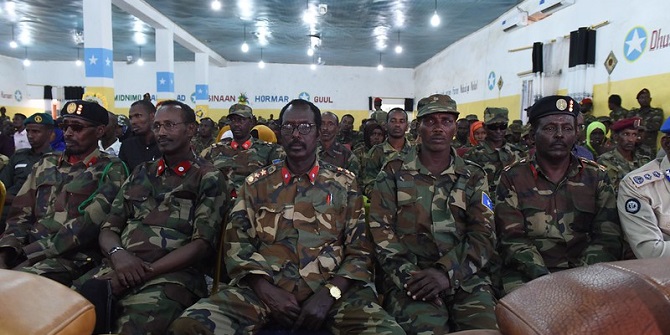
The Presidential elections in Somalia are at an impasse. Since the discredited elections of August 2019 in Jubbaland, which saw both protagonists failing to achieve their aims, Jubbaland (and its President and backers) has played a key role in opposing President Mohamed Abdullahi Mohamed ‘Farmajo’.
The purpose of this blog post is to draw attention to a research memo by the same name, which provides some historical and identity-based context to the current political impasse and the position of Jubbaland and its President within that. The Federal Member State of Jubbaland plays a crucial role in relation to both national and regional politics in the Horn of Africa, given its borders with both Kenya and Ethiopia, as well as significant Ogadeen populations in both of those countries.
Somewhat lost, however, in the current political turbulence is that Jubbaland, under its long-standing strongman and President, Ahmed Mohamed Islam ‘Madobe’, has – or, more accurately had – represented a return of Ogadeen identity and pride within the wider Somali milieu, after several decades of marginalisation. The Ogadeen are the single largest Somali clan family in both Kenya and Ethiopia and are highly politically influential in both countries. The establishment of Jubbaland in 2013 cemented the return of Ogadeen political relevance to Somalia. This was widely celebrated across the Ogadeen population in the Horn of Africa and in the diaspora. Ahmed Madobe was its star.
The creation of Jubbaland, particularly under its only real figurehead, was enabled by the aligning of transborder clan interests of the Ogadeen, with the state interests of Ethiopia and Kenya. Madobe’s supporters, crucially, lobbied successfully for him in Ethiopian circles. Former President Abdi Mohamoud Omar ‘Iley’ of Somali Regional State, Ethiopia and former Minister of Defence, Mohamed Yusuf Hajji, were part of this Ogadeen revival and, the latter in particular, of Jubbaland itself.
The last four years have changed many of these configurations. Still acting President Farmajo is now allied to Ethiopian PM Abiy Ahmed and Eritrean President Isaias Afewerki, and has used Ethiopia’s coercive capacity in regional elections. Under this arrangement, Madobe has lost the backing of Ethiopia and relied on Kenyan support to claim victory in the largely discredited August 2019 state elections. Jubbaland has since become politically and administratively divided between federal and regional interests. The Belet Hawa attack, on 25 January 2021, symbolised these differences and their pertinence to the current political impasse in the country.
The pan-Ogaden project of Jubbaland is no more. The turmoil around the 2019 elections widely undermined belief in Madobe and reduced political contestation to narrow clan-based lines with President Farmajo. However, Madobe has successfully outstayed his peers in the country, a major achievement in many regards but, on the other hand, where the rotation of power is an unwritten norm in politics and society, he is seen as a one-man state in many eyes. It remains unclear how his story will continue.
The salience of ‘clan’ and ‘clannism’ as an explanatory factor in Somali politics is often over-stated, disguising other dimensions. Clan is itself highly mutable, evoked at different levels in the agnatic tree depending on purpose. Pride and prestige do however play major roles in Somali society and politics. The research memo from which this blog has drawn raises attention to the longer-term ebbs and flows in the evocation and expression of power within the Ogadeen clan family. The last ten years are associated with a rise in Ogadeen power and position in the Somali regions, where powerful figures have simultaneously risen in Ethiopia, Kenya and Somalia.
Note: The CRP blogs gives the views of the author, not the position of the Conflict Research Programme, the London School of Economics and Political Science, or the UK Government.






Dear
Its never been wrutten such way and in particular a group of pple that make most of Somali clans that has suffered centeries under the brutal EU and Ethiopian expansion. Ogaden clan is believed to have lost men to the national struggle and to Somali nationality more than any other tribes in Somalia. When the white man arrived East Africa, they have fought firmly and fiercely and unfortunetly the Scrub for Africa conference in Berlin in 1884 become the bad fate to divide this family. The resistence continued over centuries in different capacity and under different circumstances to as recent as 2010 when UWSLF signed an agreement with Eprdf and later OnLf in 2018.
Ogaden lives in South West State of Somalia and they can also be found in Erigavo in Somaliland but nothing has yet brought them under one banner. It was Ugas Nuur Caburiye who held the overarching rule but yet to be replaced by such leader.
Ogadenis has expanded by the sword and spear in conquest and reached far more than other Somalis.
Historical writings can be found in British libraries from 17th century. Jubaland project is one and most significant one in recent times but proceeded by the politocal serenity with Ethiopia
Males Zenawi has been smart enough to follow and study the political achievement of kenya and saw how Ogdenis in Kenya made themselves useful and figureheads in Kenyan politics. He saw the same opportunity and used Abdi Iley to cultivate further and tame his own clan harshly first. The rest is a history
Once more thank you and please note this is only a snapshot of the history